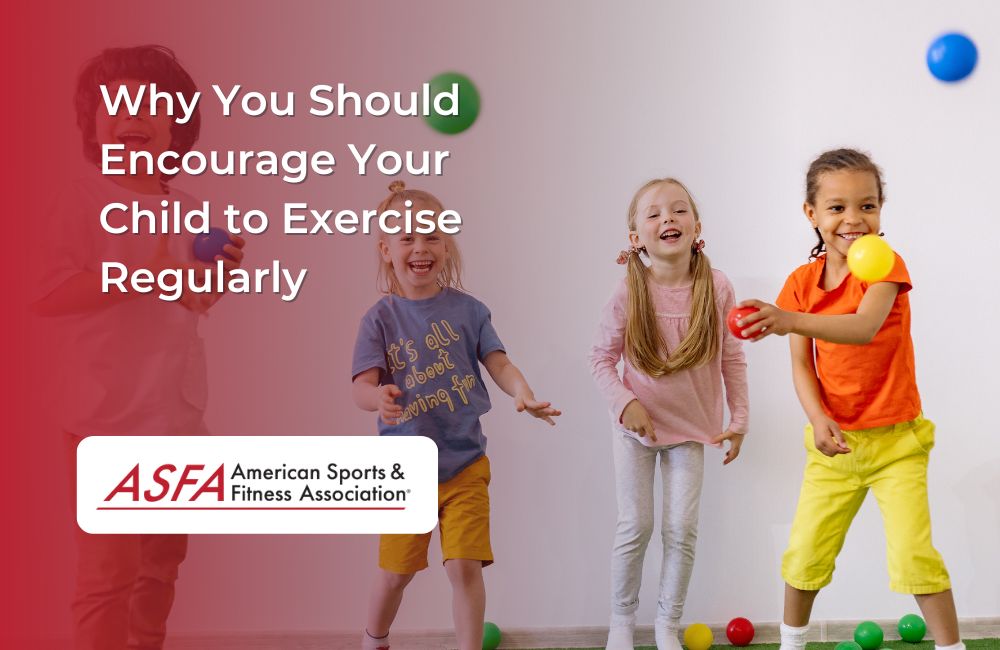
Why You Should Encourage Your Child to Exercise Regularly
It’s no secret that exercise is good for you. When it comes to children, however, most parents don’t encourage their kids to be active. Many parents believe that their kids should wait until they are older before being encouraged to exercise regularly. The truth is that children can benefit from being active at an early age and there are many benefits associated with encouraging your child to exercise regularly.
Exercise is important for overall health
Exercise is important for overall health. It helps to keep your child healthy and strong, which can help to prevent diseases such as heart disease, diabetes, and cancer in the future. Exercise has also been shown to improve mood, energy levels, and sleep patterns.
Exercise is also a great way to get your child interested in fitness and health. Children who are active often eat healthier and make good choices about what they put into their bodies. This can help to prevent obesity, which is becoming more common among children today.
Exercise can help your child maintain a healthy weight
It's important to maintain a healthy weight.
When you think of your child's health, you probably think about the importance of eating right and getting enough sleep. But exercise is also an essential part of staying fit and healthy--and it can help prevent or manage many diseases in children and adults alike.
- The difference between weight and body fat percentage: It's important to know that while both measurements are useful for assessing overall health, they're not interchangeable. Weight refers to how much mass (or matter) there is in someone's body; this includes bones, muscles, organs, and other parts as well as fat tissue.
- Body fat percentage measures how much of this mass consists entirely of adipose tissue (fat). When we talk about being overweight or obese based on BMI (body mass index), we're referring specifically to BMI calculated using only height measurements.
- How much exercise is needed? In order for kids under 18 years old who aren't involved in organized sports programs or other structured physical activity programs through school or elsewhere during weekdays to get enough moderate-intensity aerobic activity each day recommended amount equals at least 60 minutes per day spread out over three sessions each lasting 20 minutes long separated by periods rest throughout the day; additionally, some strength training activities should be included into a routine each week.
- What happens if there isn't enough physical activity? If children don't get enough physical activity every day then risk factors such as obesity increase significantly resulting in decreased quality of life expectancy later adulthood along with an increased risk of developing heart disease diabetes type 2
Exercise helps kids feel better about themselves
Exercise can help kids build confidence, relieve stress and feel better about themselves.
It's no secret that exercise is good for kids--and it's not just because it improves the body. Exercise boosts self-esteem and builds character. It also gives children a sense of accomplishment when they reach their goals, which can be very important at this age as they're transitioning into adolescence and starting to develop their own identities apart from their parents' influence or guidance.
While it's important for parents to set good examples by exercising themselves, it's also essential that they encourage their kids to exercise and help them find ways to do so. If your child is reluctant or resistant, don't be discouraged--just keep trying until you find something that works.
Exercising regularly improves concentration, focus, and memory
Exercising regularly is an excellent way to relieve stress, improve your mood and sleep quality. It also helps the brain work better by stimulating the release of chemicals called endorphins that make you feel good. Exercise can even help build confidence in children who are struggling with their weight or self-esteem issues.
Because exercise can be done anywhere at any time, it's one of the best ways for children to build strong bodies without having to spend hours sitting in front of a TV or computer screen. If you want your child's mind and body to be healthy throughout childhood and into adulthood, encourage them to get moving today!
Regular exercise can help your child make friends.
- It's no secret that exercise can boost confidence and self-esteem, and this is especially true for children. When they are more confident in themselves, they're more likely to approach others with an open mind and friendly attitude. This can lead to new friendships!
- Exercise also gives kids an outlet for their energy, which means they will be less likely to get into trouble by acting out when they're bored or frustrated--instead of getting into fights at school or being suspended from sports activities because they were rude on the field/court/track/etc., they'll have an outlet for all of their pent up energy!
Exercise is important for your child's health and well-being.
- Kids who exercise regularly have better overall fitness, higher self-esteem, better moods and sleep patterns, and a lower risk of obesity and other chronic diseases such as diabetes or heart disease.
- It's never too early to start exercising with your child - even newborns can benefit! Many parents choose to bring their babies along when they go running or biking in order to get some valuable bonding time while also helping their baby develop motor skills like crawling or walking. You may also want to consider enrolling your child in an organized sports program once they reach school age so they can participate in group activities that will encourage their development socially as well as physically (and maybe even earn them some bragging rights).
Conclusion
Exercise is a great way for kids to stay healthy, feel better about themselves and make friends. It's also something that will benefit them throughout their lives. So if you have children, encourage them to exercise regularly!



